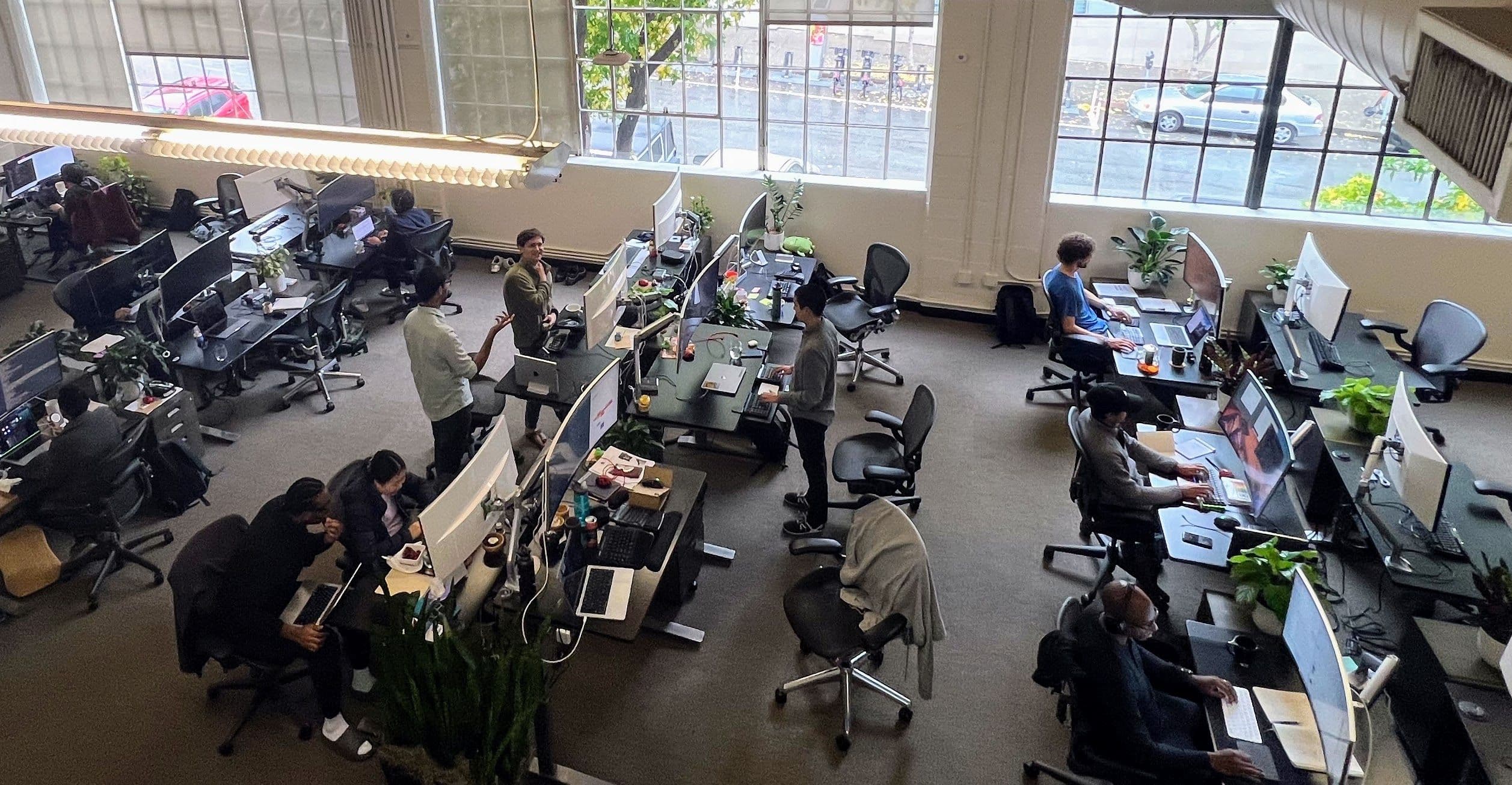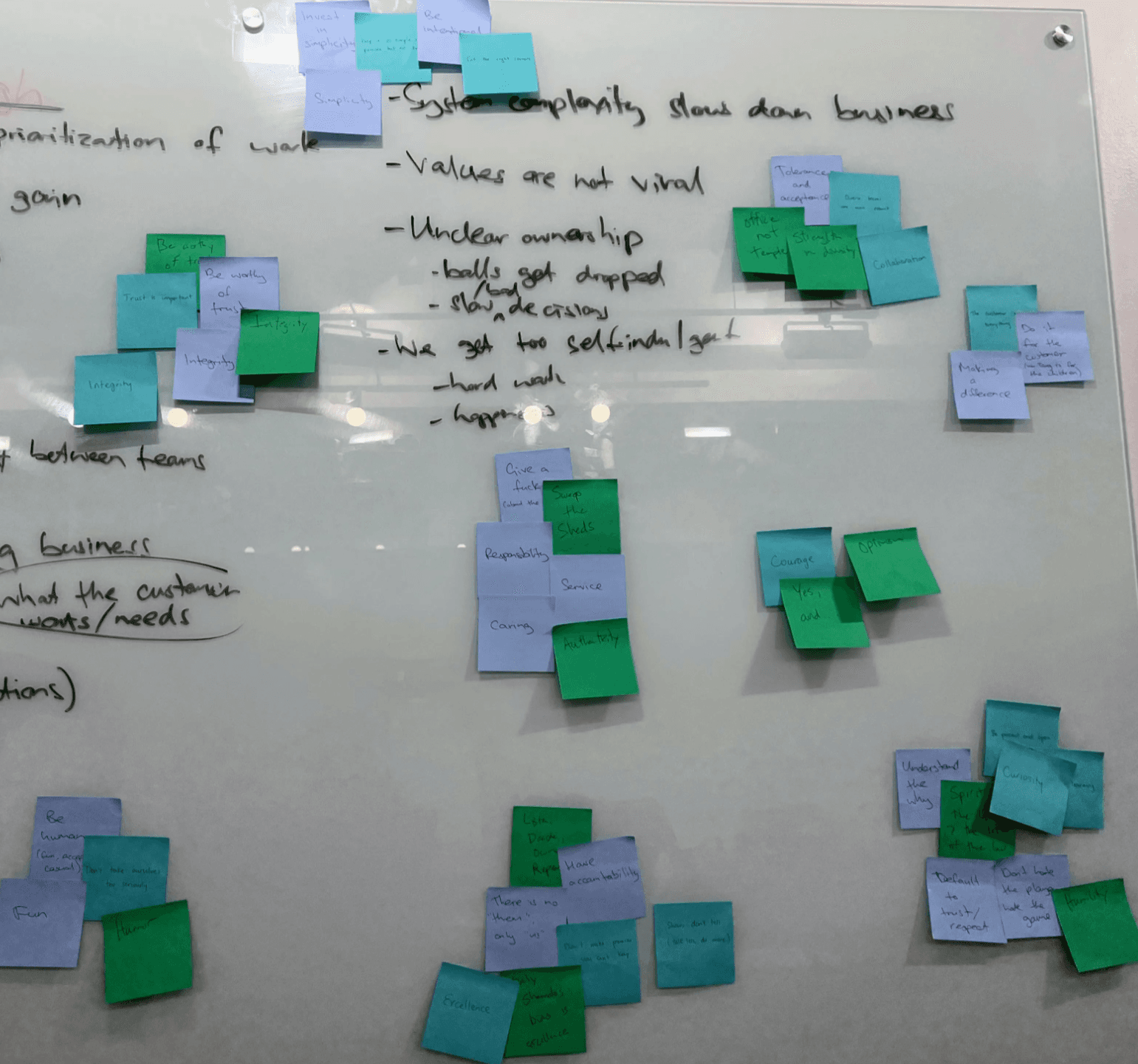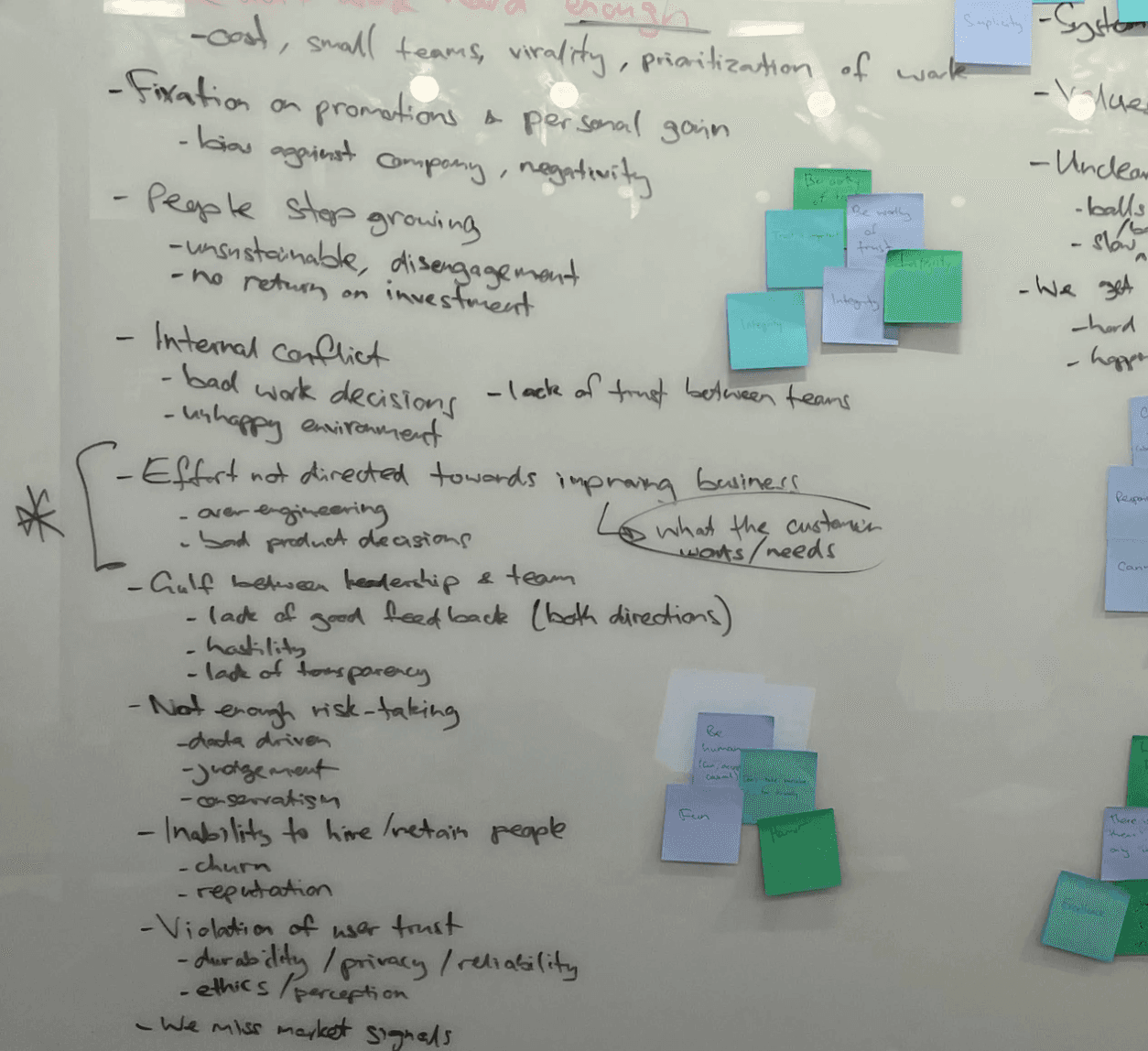
Company Values that Matter

What makes a good set of values? Do companies even need them? Aren’t they just empty platitudes that achieve little more than eye-rolls from the engineering team? Yes sometimes, but I think a good set of values can be critically important in establishing a team that stands for something.
Values underlie everything we do
I’ve spent a lot of my career getting pulled in to resolve conflicts in engineering organizations. These conflicts usually involve two parties who are smart and well-intentioned yet think the other party is neither of these things. I rarely meet engineers who are dumb and have bad intentions. There must be something missing.
My model for human decision-making looks something like the following, where each layer depends existentially on the layer above:
| Concept | Meaning | Timescale |
|---|---|---|
| Values | What is important to us? | Enduring |
| Why | What are we trying to achieve? | Long |
| What | What do we need to build to achieve this? | Medium |
| How | How do we go about building it? | Short |
Engineers spend so much of their job dealing in the “how” that they sometimes forget they have a set of values deep in their psyche that critically influence everything they do.
If one group believes in shipping fast and reacting to user feedback while another believes in correctness and a simple feature set then they don’t have values alignment. They can argue all day about whether to add another special-case API and never see eye to eye.
It doesn’t matter how hard people try to do the right thing if they don’t agree on what’s right.
So what makes a good set of values?
Good values should involve a tradeoff
If the opposite of a value is nonsensical, then the value is meaningless.
I loved it when Facebook had the value “move fast and break things.” I didn’t interview there because that’s not what I value, but it’s a legitimate tradeoff I can respect. Then years later it gained a few syllables with “move fast with stable infrastructure” but lost a whole lot of meaning along the way. Do you want me to move fast or slow down and get it right? I don’t know many companies with the value “move slow with unreliable infrastructure”. It might as well just say “be better at stuff.”
A value needs to involve a tradeoff. It’s meant to guide decision making and needs to capture an actual opinion, an opinion you’re willing to stand behind when times are tough.
Each company value at Convex comes with a set of “intentional tradeoffs” illustrating some of the costs we actively accept. Take a look at the tradeoffs in our “Make Work Human” value. It sounds positive on the surface, but it also means people need to come to the office in-person, need to put up with distractions, sometimes need to keep their controversial opinions to themselves, and shouldn’t look to me to tell them how to think about a political issue or global tragedy. These are certainly not universal values at modern corporations.
Convex value: Make Work Human
Make Work Human
We aren’t a bunch of algorithms or twitter profiles, we’re a group of human beings with feelings. Our customers aren’t just accounts in a database, they are real people. As a company we should be fun, sincere, informal, occasionally silly, sometimes irreverent, and always human. Our team and product will be enriched by a diverse set of thoughts, backgrounds and experiences. In order to support this diversity we need to match it with inclusivity: we should be accepting of differences, tolerant of perspectives disjoint from our own, and invest the effort required to understand the human behind an idea.
Intentional Tradeoffs
- Sometimes the office will be a little noisy, or distracting, or there’ll be social activities going on, even when you’re trying to get work done. We have to not only embrace a friendly workplace but also put in the effort to deliver on our work expectations regardless.
- We’ll develop our own cultural identity, stories and jokes. Sometimes new folks may feel excluded by this. We need to develop a shared language and history by pulling newcomers into the fold.
- While a diversity of people will lead to a better global outcome, it can also make decisions take longer than in a pure monoculture. We’re willing to take a short-term productivity hit for the greater good.
- A diversity of people means Convex will be full of talented, well-intentioned people who do not agree on all issues, both in or outside of work. We embrace that we don’t need to agree on every world issue to be effective, respectful, and supportive teammates.
- When issues aren’t relevant to our business or employee wellbeing we’ll often have to think for ourselves rather than looking to the company to guide us or confirm our beliefs.
Good values should not be aspirational
Violating your values is a big deal. You should probably feel bad. So they obviously need to reflect the current reality of your organization. If you’re not even acting in accordance with your values on day one, then you likely never will.
Don’t try to use values to “reboot” your company culture. Get your house in order then codify the status quo in a set of principles that reflects who you are, not who you want to be.
The value “Do it for the why” is deeply ingrained in our DNA. We talk about it every planning meeting. Our product is very intentionally designed and everyone here knows you can’t get away with working on a project without a crisp articulation of why you’re doing it and what you hope to achieve. “My manager told me to” is not a satisfactory answer… even if I’m the manager.
If you’re a data-driven startup thrashing around and iterating your way to success then that doesn’t fit our definition of “doing it for the why.” If you’re a command-and-control style organization where the team just does what they’re told, this is also not how we operate. We all have different styles, you do you, but pick values that uniquely capture who you are and how you operate.
Convex value: Do it for the Why
Do it for the Why
Everything we do should be motivated by a deep understanding of the value we’re trying to create. What we do and how we do it are important, but they are irrelevant if we don’t understand why we’re doing it to begin with. When we encounter disagreements, take the time to understand the why behind each others’ positions and what we might learn from it. Success will come from a deep focus on what matters to our customers, not what happens to be cool or aligns with our personal interests. We may cut corners or take bets but we should always do so from a place of deep intentionality anchored in why we’re here.
Intentional Tradeoffs
- It takes work to figure out what we’re doing. Curiosity takes effort. This may occasionally slow us down and that’s ok.
- If we disagree passionately on a technical approach we need to stop, take a breath, and invest the effort in understanding the root cause of the disagreement. This often requires going against our natural instincts.
- We may need to come up with a boring solution to a problem rather than an exciting impressive one.
Good values should not be designed by committee
Remember the first paragraph when I said values are about standing for something? It was only a couple of minutes ago. Unfortunately this means you can’t just send out a survey and crowd-source your values.
Values underlie all decision-making at your organization. They’re the first step towards rallying a team around the “why”, “what”, and “how”. You have to actively drive this process and own the outcome of it. The values also need a cohesive voice and to fit together into a set of guiding principles, rather than just a grab bag of opinions.
Everyone at Convex gets behind the “give a shit” value but they may not have suggested it. It’s not easy for someone to suggest that the best way for them to grow is to prioritize the mission over themselves, but it's what we believe here. Sure the profanity in the name is a little tacky but we didn't want to pull our punches with our commitment to the value. It’s hard to reject job candidates who are world class in their field but don’t actually care about our product, yet we do this all the time.
We stand behind these values and I wouldn’t expect the team to respect them otherwise.
Convex value: Give a Shit
Give a Shit
We’re on a difficult mission, where the odds are formidably stacked against us. This journey will require trying, failing, and learning, along with a whole lot of passion. We’ll have to work hard at this and make sacrifices for the mission. When we prioritize we put the mission first, then our team, and then ourselves. We believe in maximizing personal growth by devoting ourselves to the problems that matter. We help each other succeed, share in credit for successes, and support each other in setbacks.
Intentional Tradeoffs
- A startup has to make a lot of wrong decisions on the path to discover the right ones. We have to be ok with this and to maintain our efforts even when there aren’t immediate tangible results.
- This isn’t a great place just to chill or maximize non-work activities. Part of the value in working at Convex is the joy of pulling hard towards a common goal.
- Sometimes we’ll need to do boring work, deal with negative consequences, or step in to fill gaps outside our domain. Convex winning is the best path to us winning as individuals.
- There is no room for not caring about the company, no matter how good you are at your job. We won’t hire people who don’t share in our mission.
Good values should be relevant to the business
This isn’t just another virtue signaling exercise, the values need to be directionally relevant to the business. Being true to them should help your company succeed and ignoring them should hinder your success. Success means more than just making money of course, presumably you also want to create something of value.
The impact of company values usually only shows up on long timescales. If done right they’ll have a lasting cultural impact and guide your company long after you’re gone. If done wrong it’ll take a long time to notice and then they’ll be very hard to change. Values have inertia.
Convex places a high importance on being intentional and passionate about our work (do it for the why, give a shit) but as a result it can be easy to spend too much time debating instead of actually building. This is why we have the “drive forward progress” value. It recognizes that we’re a business that needs to ship, that talk is cheap and doing is hard, and that the company will reward those who are brave enough to push us forward.
Convex value: Drive Forward Progress
Drive Forward Progress
A lot of the best ideas take a long time to hone into something great. It’s easy to be dismissive of fledgling ideas but hard to take a new idea and turn it into real value. As a company we celebrate those who create value by embracing uncertainty, pushing the company forward, and leading with action not just words. Forward progress requires boldness, personal responsibility, and a high level of accountability.
Intentional Tradeoffs
- Convex employees won’t succeed by de-risking all decisions to the point of inaction. We expect people to make active choices and push the company forward, even if that entails a risk of failure.
- Sometimes we’ll be forced into difficult discussions where we’ll have to disagree and commit, allowing the decision maker to take responsibility.
- It can be intimidating to operate in an environment of uncertainty but this is the reality of a startup. It also makes for the best personal growth. We can’t ever guarantee consensus on a decision but we do expect support from each other.
- Sometimes we’ll have to kill projects that were well-intended but unsuccessful. This is hard to do but a sign of ownership and progress.
Good values should be meaningful
This is the most important part; good values have to be significant. They need to resonate with the team. People should get upset if they see them being violated.
The most important Convex value is “Be Worthy of Trust”. We stole that one from Dropbox... but like… in a trustful way.
It’s easy to be cynical of big companies but we really lived that value at Dropbox. Being worthy of trust was hard. We spent huge amounts of money and effort doing things like building a storage system that never lost a file ever. I can’t tell you how many weekends we worked and social events we had to skip. I also don’t think I ever heard someone complain about it. We were doing something we cared about, and the fact that everyone else cared about it too made it feel like a movement. That was a great job.
Convex value: Be Worthy of Trust
Be Worthy of Trust
Integrity underlies everything we do. Our customers entrust us with their private data and with the future of their businesses, but trustworthiness is also about how we conduct ourselves and treat each other. Trustworthiness is not about how we act when we’re being watched, it’s about how we act when no one is watching. It’s hard to build and easy to destroy. Being worthy of trust is a way of life and is the foundation upon which we build everything at Convex.
Intentional Tradeoffs
- If bad things happen, e.g., with mistakes with customer data, we’ll be willing to take the embarrassment or reputation hit to admit it.
- There may be times where doing the right thing for our customers will be inefficient, but we’ll still worth it to maintain trustworthiness.
- We will often need to assume good faith in each other’s plans without having proof that the other party is well-intentioned. We will accept occasional mistakes in order to maintain an altruistic environment free of excess skepticism.
 Young Sujay interrupting a bike ride to respond to a production issue, a decade before cofounding Convex. I am helpfully taking photos instead of helpfully helping.
Young Sujay interrupting a bike ride to respond to a production issue, a decade before cofounding Convex. I am helpfully taking photos instead of helpfully helping.
Picking good values
Picking values is meant to be hard. It’ll take time reflecting on what your company stands for and what’s unique about it.
The Convex co-founders have very different working styles but are strongly aligned on values. That alignment is why we work together, and is also the only reason Jamie and I haven't tried to strangle each other. When we started the company we even wrote a “founder marriage” doc where we restated our personal values going into a startup to make sure we were on the same page, despite having worked together for eight years.
We didn’t pick company values until a few years into running Convex and all our youthful optimism was stripped away. The rough process was:
-
The founders met on a series of weekends when there wouldn’t be any work distractions.
-
We individually brainstormed values on post-it notes then tried to group them into clusters on the whiteboard.

-
We got lunch. I caught covid. I ate pasta, it was good.
-
We wrote down a set of cultural risks that could lead to the business failing. This part was easier because we’re engineers and engineers are good at being negative.

-
We cross-referenced the values and risks and asked if the values were necessary and sufficient to help the business succeed in the way we want it to. Then we tried removing and merging some of the clusters and repeating the process.
-
We stared into space for a long time then repeated step 5.
-
See step 6.

-
We ended up with five clusters and came up with a short phrase to capture each one. This was before ChatGPT so we had to use our brains to do this. You can ask your grandparents what that was like.
-
Over the next few weeks we interviewed engineers at the company what they think the values should be. We didn’t want to pick values by committee but also wanted to make sure there wasn’t any misalignment with the team. Turns out we were aligned. If you’re not you might want to bail out and fix that first.
-
We each took a shot at writing descriptions for the values and a list of downsides we’re willing to own in order to uphold them. We had a single person write the final descriptions and tradeoffs so they’d have a consistent voice. Then Sujay went and changed all my punctuation because he’s pedantic like that.
-
We had a company meeting where we talked through the values, answered questions, discussed tradeoffs etc. It went well. It would have gone less well if we didn’t take our time getting to this point.
-
I forgot to write a blog post about it for two years.
-
Well here we are.
This process was as arduous as it sounds. Unlike many other management activities however we all came out of it glad we spent time being systematic about what we value, and proud that we have a set of values that the team actually cares about.
Hopefully your values process is similarly useful to you, and hopefully you also end up with something opinionated. Ideally your values will help attract employees you want to work at your company and ideally it’ll turn some people off too. Both of those are great outcomes and will aid in building an organization that, above all things, stands for something.
A huge thanks to Mindy Zhang who got us pointed in the right direction with some great advice when we started defining our values at Convex. Thanks also to the early Dropbox crew who created one of the strongest engineering cultures in the industry and influenced us in many ways.
Convex is the backend platform with everything you need to build your full-stack AI project. Cloud functions, a database, file storage, scheduling, workflow, vector search, and realtime updates fit together seamlessly.